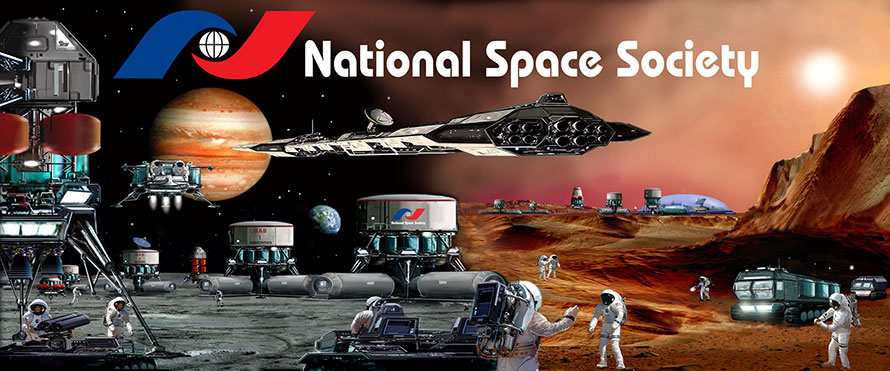
- Roadmap Table of Contents
- Part 1: General Milestones
- Part 2: Utilization and Development of Cislunar Space
- Part 3: To the Moon
- Part 4: To Mars
- Part 5: Asteroid Mining and Orbital Space Settlements
- Part 6: Additional Expansion and Greater Sustainability of Human Civilization
The National Space Society (“NSS”) is a nonprofit educational organization whose Vision is: “People living and working in thriving communities beyond the Earth and the use of the vast resources of space for the dramatic betterment of humanity.”
This vision of space settlement embraces both space as a future second home for humanity, in the form of a free, spacefaring civilization, and the resources of space (such as the Sun’s energy for space-based solar power, extra-terrestrial minerals for raw materials, and low-gravity for manufacturing) being used for the benefit of all of us on the Earth. These two elements of the vision are intertwined: development of space products and services for the people of Earth will both require human presence in space and will enable and motivate expansion of our species away from the home planet.
NSS believes that space development and settlement will occur most efficiently, and humanity’s prosperity will be best ensured, if the “free market” drivers of competition and profit are used, and if every human being is given the freedom of thought and action.
GENERAL DRIVERS FOR SPACE SETTLEMENT
There are a multitude of driving forces pushing for space settlement. Here are some of the most important reasons, rationales, and goals:
- Improving the quality of life on Earth.
- Providing space-based services via satellites to the Earth such as improved communications, remote sensing, navigation and weather prediction.
- Greatly enhancing the chances for the long-term survival of humanity and many other Earth species by ending the “all the eggs in one basket” problem. In the words from a poem by Leslie Fish: “If you would not perish then grow.”
- Developing and using space resources to reduce the need to rely only on Earth-based resources and industry.
- Protecting the Earth and its environment from asteroid impacts and climate change.
A future that includes humankind expanding into space is vastly preferable to one in which we are limited to the resources of Earth.
This Roadmap has been prepared to lay out for the public the major Milestones that will likely need to be passed and the major Barriers that will need to be surmounted in order for humankind to achieve the NSS Vision. A Milestone in this context is an achievement or event that significantly promotes or advances any of the reasons, rationales, or goals in space listed above.
Due to the branching nature of any growth pattern such as human civilization, the milestones should not be thought of as arranged along a single route, but instead marking major nodes along the branches.
While the Roadmap to some extent highlights what can, should and will be done by the United States, which to date has been the leader in off-Earth space exploration and development, it is equally applicable to all countries of the world. Eventually the entire world will participate in achieving this vision and reaping its fruits.
NSS has defined 31 major Milestones, based on our current knowledge and perspective. These can be achieved with incremental advances in current technologies. However, researchers around the world are pushing the frontiers of science in many fields, and at any time breakthroughs may enable us to shatter Barriers and leapfrog Milestones.
Of the Milestones currently identified, some must be reached en route to the settlement of all destinations – the Moon, Mars, asteroids, orbital space settlements, and, eventually, the stars. Specific Milestones then follow for each of these destinations. These Milestones are presented here, with commentary on their current status, along with changes and developments necessary to reach them.
These Milestones will be reached by a combination of governmental and nongovernmental efforts. Populating space and utilizing the resources of space will be goals pursued by many governments and/or private groups. Space settlement is in part driven by the basic human nature to survive and thrive.







